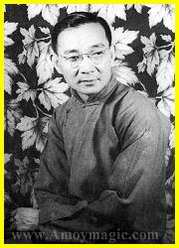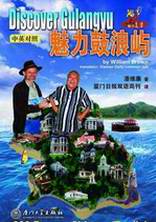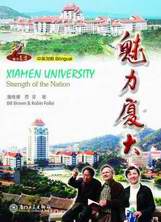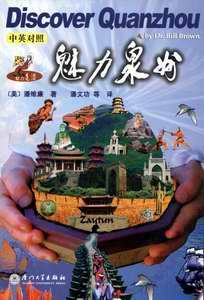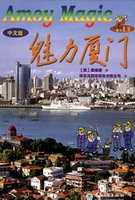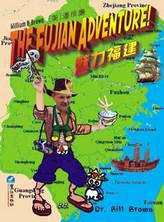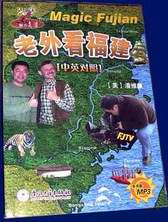![]() Click
to
Access
Click
to
Access
OUTSIDE China
![]() Click
to Access
Click
to Access
INSIDE
China ![]()
TRAVEL LINKS
![]() Xiamen
Xiamen
![]() Gulangyu
Gulangyu
![]() Jimei
Jimei
![]() Tong'an
Tong'an
![]() Jinmen
Jinmen
![]() Zhangzhou
Zhangzhou
![]() Quanzhou
Quanzhou
![]() Wuyi
Wuyi
![]() #1Fujian
Sites!
#1Fujian
Sites!
![]() Fujian
Foto Album
Fujian
Foto Album
![]() Books
on Fujian
Books
on Fujian
![]() Readers'Letters
Readers'Letters
![]() Ningde
Ningde
![]() Zhouning
Zhouning
![]() Longyan
Longyan
![]() Sanming
Sanming
![]() Putian
Putian
![]() Bridges
Bridges
![]() Travel
Info,
Travel
Info,
![]() Hakka
Roundhouses
Hakka
Roundhouses
![]() Travel
Agents
Travel
Agents
MISC. LINKS
![]() Amoy
People!
Amoy
People! ![]()
![]() Darwin
Driving
Darwin
Driving ![]()
![]() Amoy
Tigers
Amoy
Tigers
![]() Chinese
Inventions
Chinese
Inventions
![]() Tibet
in 80 Days!
Tibet
in 80 Days!![]()
![]() Dethroned!
Dethroned!
![]()
![]() Misc.Writings
Misc.Writings
![]() Latest
News
Latest
News
![]() Lord
of Opium
Lord
of Opium
![]() Back
to Main Page
Back
to Main Page
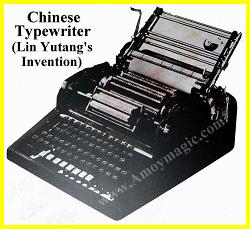
Click Thumbnail for Larger Image
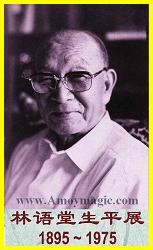
Click thumbnail for Larger Image
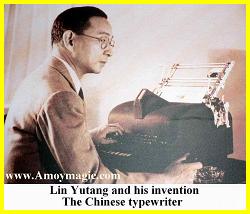
Click thumbnail for
Larger Image
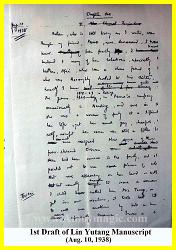
Click Thumbnail for Larger
Image
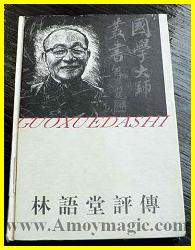
Click Thumbnail for Larger
Image
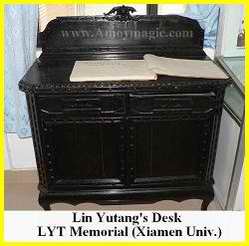
Click Thumbnail for Larger
Image
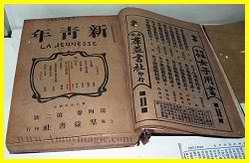
Click Thumbnail for Larger
Image
![]() Order
Books
Order
Books![]() Xiamenguide
Forum
Xiamenguide
Forum 
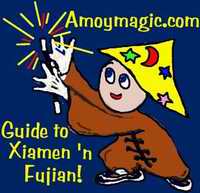
An International Chinese Writer
Click Images for Larger Photos![]()
![]() Lin
Yutang Photo Album
Lin
Yutang Photo Album
Lin
Yutang, who was schooled on Gulangyu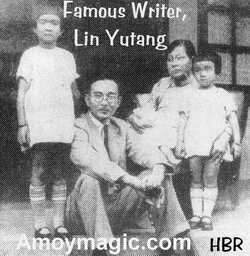 and taught at Xiamen University from 1926-1927,
was the first Chinese author to reach the top of the New York Times bestseller
list. Pearl S. Buck had to urge the anxious author to publish his 1935
bestseller “My Country and my People,” but Lin went on to
do more than any one in his generation to bridge the gulf between East
and West.
and taught at Xiamen University from 1926-1927,
was the first Chinese author to reach the top of the New York Times bestseller
list. Pearl S. Buck had to urge the anxious author to publish his 1935
bestseller “My Country and my People,” but Lin went on to
do more than any one in his generation to bridge the gulf between East
and West.
“However inclined one may be to regard the Chinese as strange, peculiar, fantastic, or impossible, for no other reason than that one has never been fortunate enough to gain their friendly, intimate acquaintance, the reading of Mr. Lin's book will very soon dissipate any notion of uncertainty and assure one of the truth[s] of the Confucian statement, that ‘Within the four seas all men are brothers.’” “The East Speaks to the West,” The New York Times review of “My Country and My People” 8 December, 1935
Lin was born the
seventh of a Presbyterian minister’s eight children in Longxi on
October 10th, 1895. Like his father, Lin read everything he could lay
his hands on. An Amoy missionary, Abbe Livingston Warnshuis, ardently
promoted higher education to develop leaders for the new China he believed
was coming, and fueled the family’s intellectual fire by sending
them books and pamphlets on both Christian and scientific issues. It was
a blessing for young Lin Yutang, but led to tragedy for his second oldest
sister and best friend, Mei-Kung.
Back to top Or Click
Here for Lin Yutang Photo Album
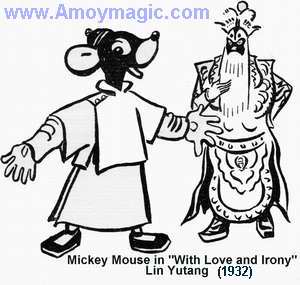 Lin’s father refused to let Mei Kong attend college because, as
Lin wrote, “college education for a girl was a luxury which our
family simply could not afford.” Denied an education, the bright
girl married at age 22, and when Lin left for college she gave him forty
cents and said,
Lin’s father refused to let Mei Kong attend college because, as
Lin wrote, “college education for a girl was a luxury which our
family simply could not afford.” Denied an education, the bright
girl married at age 22, and when Lin left for college she gave him forty
cents and said,
“…you are going to college. Don’t waste your opportunity. Be a good man, a useful man, and a famous man… That is your sister’s wish for you.’ Knowing her desire so well, I felt the full force of these simple words. It made me guilty about the whole thing. They burned into my heart with the oppressive weight of a great load, so that I had the feeling I was going to college in her place.”
Just a year later,
the 7-months pregnant Mei-Kung died of the plague, and a haunted Lin strove
to become not only “useful and famous” but also to fight injustice,
especially against women.
Back to top Or Click
Here for Lin Yutang Photo Album
When Lin was ten, he and his two brothers studied in Amoy at the American
Reformed Mission’s Yangyuan Elementary School and the Xunyuan School.
In 1912, he entered the Theological School of Shanghai’s St. John
University. He excelled at athletics, and even par-ticipated in the 1916
Far Eastern Olympics in Shanghai, but he was an unorthodox scholar. He
often skipped classes, and though he gained a reputation as an avid reader,
the books he devoured often had no relation to his classes (he wrote of
how he secretly read history books during a civil law class).
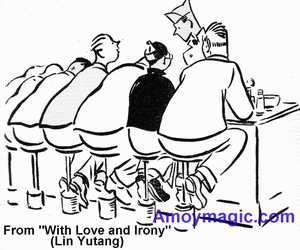 Lin gradually came to resent that Western education had denied him his
Chinese roots, and as he dove into Chinese studies, he abandoned his Christian
faith . He left the Theological School, though he remained in St. John’s
until his graduation in 1916, after which he taught at Beijing’s
prestigious Tsinghua University. He wrote,
Lin gradually came to resent that Western education had denied him his
Chinese roots, and as he dove into Chinese studies, he abandoned his Christian
faith . He left the Theological School, though he remained in St. John’s
until his graduation in 1916, after which he taught at Beijing’s
prestigious Tsinghua University. He wrote,
“To live in Peking then was to come into contact with authentic
Chinese society, to see, as it were, ancient China made manifest….Peking
was China, authentic China, with its yellow-roofed palaces and terra-cotta
temple walls and its Mongolian camels and nearness to the Great Wall and
the Ming tombs.”
Back to top Or Click
Here for Lin Yutang Photo Album
Lin longed for the East but never quite let go of the West. He continued
teaching Christian Sunday School even while delving into Chinese philosophy.
Torn, he wrote in a couplet,
“One mind seeks the learning of ancients and moderns;
Two legs straddle the cultures of East and West.”Lin went to Harvard in 1919 but before graduation left for Europe, where he completed his M.A. and, ironically, a Ph.D. in Chinese studies in the University of Jena in Leipzig, Germany. Lin enjoyed studying abroad, but he had qualms about Westerners’ preoccupation with logic and scientific method. In “My Country and My People” he wrote,
“It is easy to see why the Chinese mind cannot develop a scientific method; for the scientific method, besides being analytical, always involves an amount of stupid drudgery, while the Chinese believe in flashes of common sense and insight. And inductive reasoning, carried over to human relationships (in which the Chinese are primarily interested) often results in a form of stupidity not so rare in American universities. There are today doctorate dissertations in the inductive method which would make Bacon turn in his grave. No Chinese could possibly be stupid enough to write a dissertation on ice-cream, and after a series of careful observations, announce the staggering conclusion that ‘the primary function of sugar [in the manufacture of ice-cream] is to sweeten it’; or after a methodical study in ‘Time and Motion Comparison on Four Methods of Dishwashing’ happily perceive that ‘stooping and lifting are fatiguing’…."
Back to top Or Click Here for Lin Yutang Photo Album
“This sort of stupidity, although useful to business advertisement, could really be arrived at, I think, just as correctly by a moment of Chinese common sense and ‘intuition.’”.
In his 1937 bestseller “The Importance of Living”, Lin emphasized the “spirit of reasonableness” over logic.
“In contrast to logic, there is common sense, or still better, the Spirit of Rea-sonableness. …The Reasonable Age, if that should ever come about, will be the Age of Peace….The Sprit of Reasonableness is the best thing that China has to offer the West….Humanized thinking is just reasonable thinking. The logical man is always self-righteous and therefore wrong, while the reasonable man suspects that perhaps he is wrong and is therefore always right.”
Lin delighted readers around the globe with essays on such profound subjects as his love for loafing, and his insistence that, bottom line, we are all alike:
“I am interested only in presenting [in this book] a view of life and of things as the best and wisest Chinese minds have seen it and expressed it in their folk wisdom and their literature. It is an idle philosophy born out of an idle life, evolved in a different age, I am quite aware. But I cannot help feeling that this view of life is essentially true, and since we are alike under the skin, what touches the human heart in one country touches all.”
Lin wrote widely during the 20s and by 1930, the New York Times was writing commentaries on his works. Lin worked with Song Qingling, widow of Sun Yatsen, to create the China Democratic Rights Insur-ance League, and after 1938 he lived and traveled in Europe, where he wrote the trilogy consisting of “Peking Cloud” , “Wind and Crane’s Tear”, and “The Red Door”.
Lin returned to the U.S. in 1936 and in 1959 began attending New York City’s Madison Avenue Presbyterian Church. Lin settled down in Taiwan in 1966 and passed away in March, 1976, at the age of 80. The New York Times obituary noted,
Lin Yutang, poet, novelist, historian and philosopher, had no peer as an interpreter to Western minds of the customs, aspirations, fears and thoughts of his people and their country, China, the great and tragic land.
LINKS
Click Here for David Harris' Lin Yutang Page (includes full bibliography) David also offers a zip file of a degree thesis about Lin Yutang by Ryan Murray, of the U.S.A.
Click Here for Lin Yutang House (Taiwan) Site
For more on Magic Amoy's wonderful peoples and places, read "Amoy Magic--Guide to Xiamen and Fujian!"
![]() Favorite
Fujian Sites
Favorite
Fujian Sites ![]() Fujian
Foto Album
Fujian
Foto Album ![]() Xiamen
Xiamen
![]() Gulangyu
Gulangyu
![]() Fujian
Guides
Fujian
Guides ![]() Quanzhou
Quanzhou
![]() Zhangzhou
Zhangzhou
![]() Longyan
Longyan
![]() Wuyi
Mtn
Wuyi
Mtn ![]() Ningde
Ningde
![]() Putian
Putian
![]() Sanming
Sanming
![]() Zhouning
Zhouning
![]() Taimu
Mtn.
Taimu
Mtn. ![]() Roundhouses
Roundhouses
![]() Bridges
Bridges
![]() Jiangxi
Jiangxi
![]() Guilin
Guilin
![]() Order
Books
Order
Books
![]() Readers'
Letters
Readers'
Letters
Last Updated: May 2007
![]()
DAILY
LINKS
![]() FAQs
Questions?
FAQs
Questions?
![]() Real
Estate
Real
Estate
![]() Shopping
Shopping
![]() Maps
Maps
![]() Bookstores
Bookstores
![]() Trains
Trains
![]() Busses
Busses
![]() Car
Rental
Car
Rental
![]() Hotels
Hotels
![]() News
(CT)
News
(CT)
![]() Medical
& Dental
Medical
& Dental
![]() YMCA
Volunteer!
YMCA
Volunteer! ![]()
![]() XICF
Fellowship
XICF
Fellowship
![]() Churches
Churches
![]()
![]()
![]() Temples
Temples![]()
![]() Mosque
Mosque
![]() Expat
Groups
Expat
Groups
![]() Maids
Maids
![]() Phone
#s
Phone
#s
EDUCATION
![]() Xiamen
University
Xiamen
University
![]() XIS(Int'l
School)
XIS(Int'l
School)
![]() Study
Mandarin
Study
Mandarin
![]() CSP(China
Studies)
CSP(China
Studies)
![]() Library
Library
![]() Museums
Museums
![]() History
History
DINING
![]() Restaurants
Restaurants
![]() Asian
Asian
![]() Veggie
Veggie
![]() Junk
Food
Junk
Food
![]() Chinese
Chinese
![]() Italian
Italian
![]() International
International![]()
![]() Visas
4 aliens
Visas
4 aliens
RECREATION
![]() Massage!
Massage!
![]() Beaches
Beaches
![]() Fly
Kites
Fly
Kites
![]() Sports
Sports
![]() Boardwalk
Boardwalk
![]() Parks
Parks
![]() Pets
Pets
![]() Birdwatching
Birdwatching
![]() Kung
Fu
Kung
Fu ![]() Hiking
Hiking
![]() Music
Events
Music
Events
![]() Festival&Culture
Festival&Culture
![]() Humor&
Humor&![]() Fun
Fotos
Fun
Fotos![]()
BUSINESS
![]() Doing
Business
Doing
Business
![]() Jobs!(teach/work)
Jobs!(teach/work)
![]() Hire
Workers
Hire
Workers
![]() Foreign
Companies
Foreign
Companies
![]() CIFIT
(Trade Fair)
CIFIT
(Trade Fair)
![]() MTS(Translation)
MTS(Translation)
![]()
Back to Top
